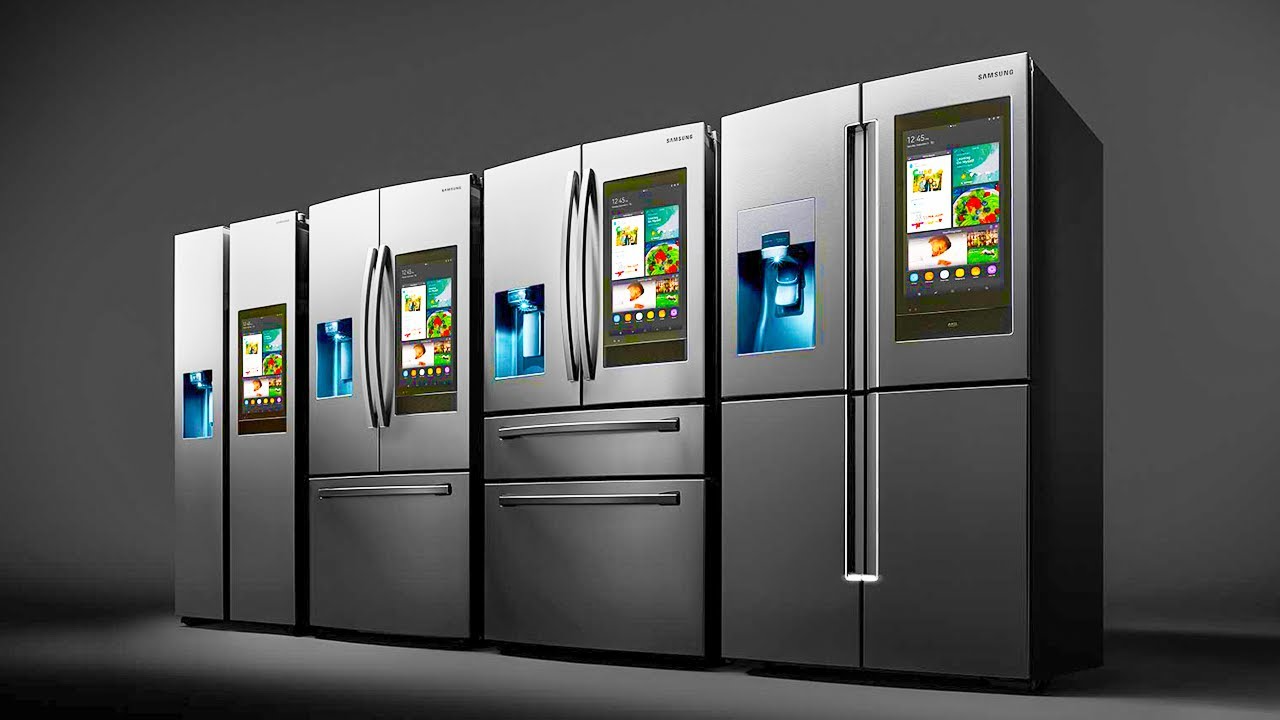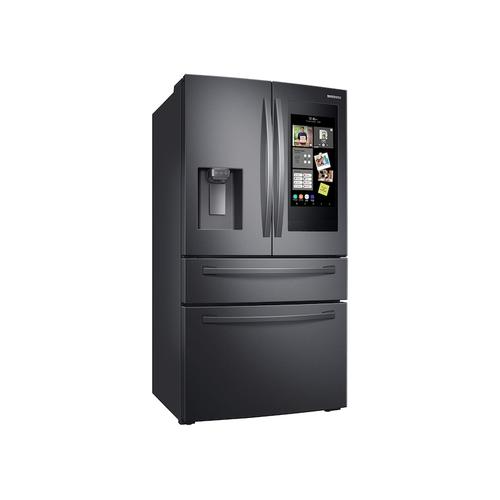In today’s rapidly evolving world of home appliances, Samsung has emerged as a trailblazer by introducing a line of refrigerators equipped with interactive screens, transforming these once mundane kitchen staples into intelligent hubs that seamlessly integrate technology and convenience. These innovative fridges not only excel in their primary function of preserving food but also serve as digital assistants, recipe repositories, family organizers, and even entertainment centers. This article delves into the key features, benefits, and potential drawbacks of Samsung’s screen-equipped refrigerators, offering a comprehensive understanding of how they are reshaping the modern kitchen experience.
Interactive Touchscreen: The Heart of Samsung’s Smart Fridge
The centerpiece of Samsung’s screen-equipped refrigerator is a vibrant, high-resolution touchscreen display, typically measuring around 21.5 inches diagonally. This intuitive interface serves as the command center for the appliance’s numerous smart functions, allowing users to interact with it much like they would a tablet or smartphone. The responsive touch controls make navigating menus, adjusting settings, and accessing various apps effortless, even for those less tech-savvy.
App Integration: From Recipe Recommendations to Grocery Lists
One of the most compelling aspects of the touchscreen on Samsung’s smart fridge is its ability to integrate a wide range of useful apps. Users can access recipe databases, such as the built-in “Chef Collection” or third-party services like Allrecipes, which offer step-by-step cooking instructions, nutritional information, and meal planning suggestions. The screen also syncs with popular grocery delivery apps, enabling users to create, edit, and share shopping lists directly from the fridge door. Moreover, some models feature AI-powered food recognition technology, which scans stored items and suggests recipes based on available ingredients, minimizing food waste and inspiring culinary creativity.
Family Hub Functionality: Staying Connected and Organized
Samsung’s screen-equipped fridges often come equipped with the proprietary “Family Hub” platform, which turns the appliance into a central hub for household communication and organization. Family members can leave digital notes and reminders, share calendars, and even make hands-free calls through voice commands or the integrated speaker system. The screen also supports popular messaging and video calling apps, allowing busy families to stay connected while juggling multiple schedules and tasks. Additionally, some models provide access to smart home controls, allowing users to monitor and manage other connected devices, such as thermostats, lights, and security systems, directly from the fridge.
Entertainment Features: Turning the Kitchen into a Multimedia Hub
Samsung’s smart fridges go beyond practicality, offering a suite of entertainment features designed to enhance the overall kitchen experience. The built-in screen can stream music and podcasts from popular services like Spotify and Pandora, filling the room with your favorite tunes while you cook or dine. Some models even support video streaming platforms like Netflix and YouTube, allowing users to catch up on shows or news while preparing meals or enjoying a quick snack. The screen’s customizable backgrounds and photo galleries further personalize the appliance, turning it into a digital showcase for cherished family memories.
Advantages of Owning a Samsung Fridge with Screen
Enhanced Convenience and Efficiency
The screen-equipped Samsung fridge streamlines various kitchen tasks, saving time and effort. The ability to browse recipes, manage groceries, and plan meals directly on the fridge simplifies meal preparation and reduces the likelihood of forgotten ingredients. Furthermore, the Family Hub functionality fosters better organization and communication within households, ensuring everyone stays informed and connected.
Energy Efficiency and Remote Monitoring
Many of Samsung’s smart fridges boast energy-efficient designs and features, such as adaptive defrosting and precise temperature control, which help reduce electricity consumption and lower utility bills. Additionally, users can remotely monitor and adjust fridge settings via smartphone apps, ensuring optimal performance even when away from home. This capability is particularly valuable for detecting and addressing issues promptly, potentially extending the appliance’s lifespan and minimizing costly repairs.
Potential Drawbacks to Consider
Cost and Complexity
One of the most significant considerations when evaluating a Samsung fridge with a screen is the higher price point compared to conventional models. The advanced technology and premium features come at a cost, which may not be feasible for all budgets. Moreover, the increased complexity of these appliances could lead to a steeper learning curve for some users, although Samsung strives to make the interface user-friendly and intuitive.

Dependence on Connectivity and Privacy Concerns
The dependence on connectivity and privacy concerns are two significant aspects to consider when evaluating a Samsung fridge with an integrated touchscreen. Let’s examine each of these factors in more detail:
Dependence on Connectivity
Internet Connectivity
For the full range of smart features to function optimally, the Samsung fridge requires a stable and reliable internet connection. This dependency can lead to several potential issues:
-
- Service Interruptions: Wi-Fi outages, network congestion, or technical issues with the router can temporarily disable or hinder the performance of the fridge’s connected features, such as remote monitoring, recipe access, or voice control.
- Compatibility and Integration: The fridge may encounter difficulties integrating with other smart home devices or platforms if they use different communication protocols or experience compatibility issues. These challenges can limit the seamless operation and convenience promised by a smart home ecosystem.
- Software Updates: Regular firmware updates are crucial for bug fixes, security patches, and feature enhancements. Without timely updates, the fridge’s performance and security may be compromised. However, this reliance on updates means that users must periodically manage and install them, which can be inconvenient or technically challenging for some.
Dependency on Cloud Services
Many smart fridge features, such as food management tools, shopping lists, and recipe recommendations, rely on cloud-based services. Dependence on these services can lead to:
-
- Service Availability: If Samsung’s cloud servers experience downtime or maintenance, users may lose access to certain features temporarily.
- Data Storage and Accessibility: User-generated content, such as grocery lists or personalized settings, may only be accessible when connected to the internet. In case of service disruptions or discontinuation, users might risk losing access to their data.
Privacy Concerns
Data Collection and Sharing
The Samsung fridge with a touchscreen collects and processes various types of data, such as food inventory, usage patterns, and even images captured by internal cameras. This data is often transmitted to and stored on Samsung’s servers or third-party platforms for analysis and to provide personalized features. Privacy-conscious users may be concerned about:
-
- Unauthorized Access or Data Breaches: Despite security measures implemented by Samsung, there is always a risk of cyberattacks or data breaches, potentially exposing sensitive information to unauthorized parties.
- Data Usage and Sharing: Users should review Samsung’s privacy policy to understand how their data is used, shared, and potentially monetized. Some users may be uncomfortable with the extent to which their data is analyzed, shared with partners, or used for targeted advertising.
- Camera Usage: The built-in cameras can help with food management but may also raise privacy concerns, especially if multiple household members have varying comfort levels with constant monitoring of fridge contents.
Voice Control and Third-Party Integrations
If the fridge supports voice assistants like Bixby or Alexa, users should be aware that voice commands are recorded and processed by these services, which may involve further data collection and sharing with their respective providers.
Conclusion
Samsung’s fridges with integrated screens represent a bold leap forward in kitchen technology, merging the traditional role of refrigeration with the convenience and connectivity of the digital age. By offering features like app integration, Family Hub functionality, and entertainment options, these appliances transform the kitchen into a multifaceted hub for meal planning, organization, and entertainment. While considerations such as cost, complexity, and dependence on connectivity should be weighed carefully, the enhanced convenience, efficiency, and energy-saving capabilities of Samsung’s smart fridges make them a compelling choice for homeowners seeking to elevate their kitchen experience and embrace the future of home appliances.




